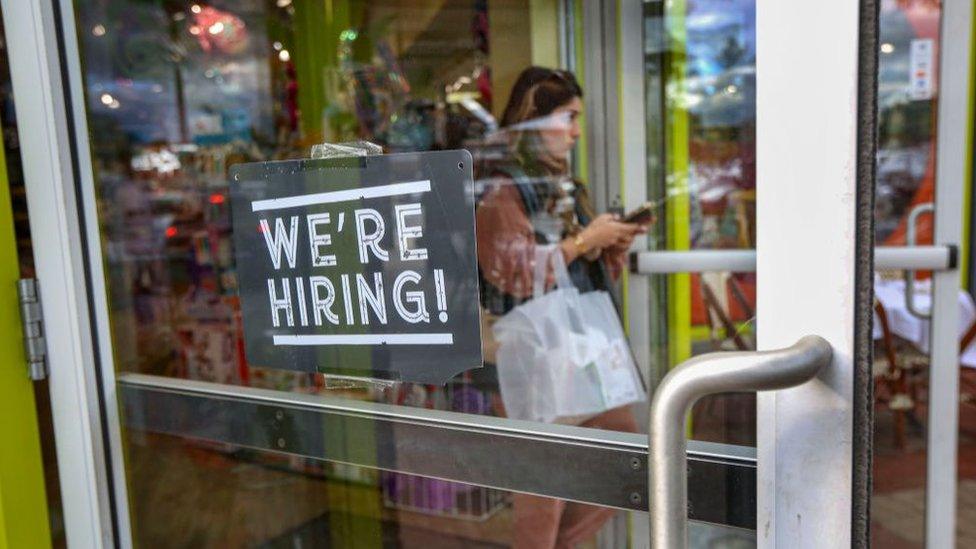Big US jobs rise in January surprises again
- Published

Job creation in the US surged in January, as the economy continued to defy predictions of a slowdown.
Employers added 353,000 jobs and average hourly pay jumped, while the unemployment rate held steady at 3.7%, the Labor Department said.
The report extended a streak of job gains that has surprised economists, who have expected a jump in interest rates since 2022 to slow the economy.
Analysts said the job market strength made an early rate cut less likely.
"The US employment data provided a shock, beating expectations by miles, with earnings much higher than expected as well," said Neil Birrell from Premier Miton Investors.
"These numbers show the US economy to be strong and will sway anyone thinking a March rate cut was on the way to look further out. Any thoughts of recession are off the mark as well for now."
The US central bank started raising rates two years ago, responding to price inflation that was rising at the fastest pace in decades.
Higher borrowing costs aimed to cool economic activity and ease pressures pushing up prices.
Price inflation has come down from the high rates seen in 2022, and stood at 3.4% in December.
But strong household spending, initially buoyed by pandemic-era savings, has kept businesses humming, generating a kind of virtuous cycle, as the healthy jobs market in turn sustains consumer spending.
Friday's report showed hiring in December and November were stronger than had been previously estimated. Health care and retail firms, as well as business and professional services, helped drive the job gains in January.
Overall, the US economy grew at an annual rate of 3.3% in the September to December period.
The head of the US central bank, Jerome Powell, this week said officials were hopeful that inflation would continue to fall without a more serious downturn.
But he warned the bank wanted "greater confidence" before it declared victory and started to lower borrowing costs again. He said a rate reduction in March, as some investors had been betting, was unlikely.
Some analysts said the strong pay gains reported on Friday - with average hourly earnings up 4.5% compared with January 2023 - should worry those hoping to see inflation continue to fall quickly.
"Wages growing at this rate, in a labour market this tight, is a problem for the Fed," said Brian Coulton, chief economist at Fitch Ratings.
Others warned that a fall in overall hours worked each week would undercut pay gains and complicated the picture.
With the US presidential election due in November, the monthly report has become a political flashpoint.
While surveys show consumer sentiment has improved in recent months, the mood remains significantly more downbeat than before the pandemic.
Analysts said that while wage gains have largely caught up recent price rises, people are still coming to terms with higher costs.
"You remember when you were paying $1 for something and now you're paying $1.17," said professor Charles Franklin, director of the Marquette Law School poll. "Adjusting to the new normal for prices - that takes a long time."
Related topics
- Published31 January 2024

- Published25 January 2024
